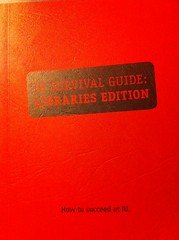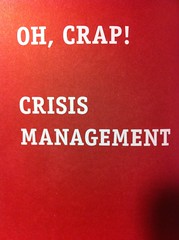This article is more than 5 years old.
The opening session of Code4Lib began with a short presentation by the Director of the UI Libraries. UI Libraries won the ACRL Library of the Year award in 2010 and my short visit showed exactly why. The library had literally transformed four floors into study space, highly networked collaboration space and an information commons that included computers, specialized equipment and support staff as far as the eye could see. Perhaps the most fun element was a printed survival guide for undergraduates.

The guide had some witty moments – if you want to see the whole thing stop by my office on Thursday!

The opening keynote by Brad Wheeler (VP for IT at IU) focused on the value of building coalitions, building and federating resources and creating a genuine “volitional dependency” in our systems, information and processes. He couched this in the context of the need for educational institutions to scale and mentioned both MIT and their open course-ware and the University of Phoenix and their ability to attract and educate hundreds of thousands of students.
Brad touched on some common tensions in higher education including the tension between innovation and scale (Sound familiar)? He focused on identifying ways to enable innovation at small scale while adopting ways to scale for production services. He talked about understanding the balance between local and cloud-based technology and between open and proprietary technology.
Brad mentioned several Meta-university collaborations, Hathitrust, Public Knowledge Project(journals), connexions (textbooks), Sakai, Kuali (Administrative – 9 open projects). In discussing the values that encourage ongoing collaboration, he discussed the impact of licensing on encouraging commercial involvement while respecting ideals of open source software. Some other areas that mentioned needing alignment included Goals, values, time-frame, talent, governance, and problem solving.
(editorial) – This perspective makes the motivations behind the OLE project make more sense, particularly in regards to the motivation to find active partners and seek commitments to investment, installation and use. Brad went as far as to suggest that the willingness to collaborate is resulting in institutional stratification, both within the institution and between institutions.
His vision for motivating organizations to collaborate to develop systems that scale included a grassroots idea of collaboration combined with finding ways to transform local innovation to larger open and cloud-based systems. Put simply he said “we have got to move beyond toy projects.” The foundation of this talk was, of course, compelling but it left me wondering how this perspective on open source and collaborative development makes the goal of inter-institutional collaboration to create and use software more realistic. In essence, he said – commit so much that you have no other options, and I suppose that in that environment institutions stand a chance of overcoming the natural tendency to solve local problems and to focus on immediate needs over longer term software and service needs.
2 Comments on ‘Code4Lib Opening session’
It would be great to put together a ZSR Survival Guide! I enjoyed reading this Erik.
I want to see the survival guide and also like the idea of a ZSR Survival Guide! So what floor can we convert to study space 😉